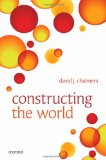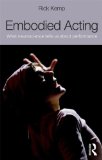October 18, 2012

Constructing the World by David Chalmers (Oxford University Press, USA)
(kindle ed.), (amazon.co.uk)
Book description from the publisher:
David J. Chalmers constructs a highly ambitious and original picture of the world, from a few basic elements. He develops and extends Rudolf Carnap’s attempt to do the same in
Der Logische Aufbau Der Welt (1928). Carnap gave a blueprint for describing the entire world using a limited vocabulary, so that all truths about the world could be derived from that description–but his
Aufbau is often seen as a noble failure. In
Constructing the World, Chalmers argues that something like the
Aufbau project can succeed. With the right vocabulary and the right derivation relation, we can indeed construct the world.
The focal point of Chalmers’s project is scrutability: roughly, the thesis that ideal reasoning from a limited class of basic truths yields all truths about the world. Chalmers first argues for the scrutability thesis and then considers how small the base can be. All this can be seen as a project in metaphysical epistemology: epistemology in service of a global picture of the world and of our conception thereof.
The scrutability framework has ramifications throughout philosophy. Using it, Chalmers defends a broadly Fregean approach to meaning, argues for an internalist approach to the contents of thought, and rebuts W. V. Quine’s arguments against the analytic and the a priori. He also uses scrutability to analyze the unity of science, to defend a conceptual approach to metaphysics, and to mount a structuralist response to skepticism. Based on Chalmers’s 2010 John Locke lectures, Constructing the World opens up debate on central areas of philosophy including philosophy of language, consciousness, knowledge, and reality. This major work by a leading philosopher will appeal to philosophers in all areas.
See also: Author’s website, including a draft of the book
Comments (0)
- Uncategorized
October 13, 2012

Embodied Acting: What Neuroscience Tells Us About Performance by Rick Kemp (Routledge, 2012)
(kindle ed.), (amazon.co.uk)
Book description from the publisher:
‘A focus on the body, its actions, and its cognitive mechanisms identifies … foundational principles of activity that link the three elements of theatre; Story, Space, and Time. The three meet in, are defined by, and expressed through the actor’s body.’ – from the Introduction
Embodied Acting is an essential, pragmatic intervention in the study of how recent discoveries within cognitive science can – and should – be applied to performance. For too long, a conceptual separation of mind and body has dominated actor training in the West. Cognitive science has shown this binary to be illusory, shattering the traditional boundaries between mind and body, reason and emotion, knowledge and imagination. This revolutionary new volume explores the impact that a more holistic approach to the “bodymind” can have on the acting process.
Drawing on his experience as an actor, director and scholar, Rick Kemp interrogates the key cognitive activities involved in performance, including:
- the relationship between thought, speech, and gesture
- the relationship between self and character
- empathy, imagination, and emotion.
New perspectives on the work of Stanislavski, Michael Chekhov, and Jacques Lecoq – as well as contemporary practitioners including Daniel Day-Lewis and Katie Mitchell – are explored through practical exercises and accessible explanations. Blending theory, practice, and cutting-edge neuroscience, Kemp presents a radical re-examination of the unconscious activities engaged in creating, and presenting, a role.
Google Books preview:
Comments (0)
- Uncategorized




